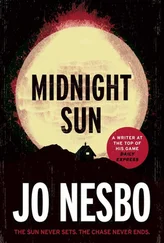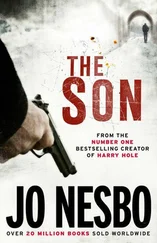Jo Nesbo - The Redbreast
Здесь есть возможность читать онлайн «Jo Nesbo - The Redbreast» весь текст электронной книги совершенно бесплатно (целиком полную версию без сокращений). В некоторых случаях можно слушать аудио, скачать через торрент в формате fb2 и присутствует краткое содержание. Жанр: Триллер, на английском языке. Описание произведения, (предисловие) а так же отзывы посетителей доступны на портале библиотеки ЛибКат.
- Название:The Redbreast
- Автор:
- Жанр:
- Год:неизвестен
- ISBN:нет данных
- Рейтинг книги:4 / 5. Голосов: 1
-
Избранное:Добавить в избранное
- Отзывы:
-
Ваша оценка:
- 80
- 1
- 2
- 3
- 4
- 5
The Redbreast: краткое содержание, описание и аннотация
Предлагаем к чтению аннотацию, описание, краткое содержание или предисловие (зависит от того, что написал сам автор книги «The Redbreast»). Если вы не нашли необходимую информацию о книге — напишите в комментариях, мы постараемся отыскать её.
The Redbreast — читать онлайн бесплатно полную книгу (весь текст) целиком
Ниже представлен текст книги, разбитый по страницам. Система сохранения места последней прочитанной страницы, позволяет с удобством читать онлайн бесплатно книгу «The Redbreast», без необходимости каждый раз заново искать на чём Вы остановились. Поставьте закладку, и сможете в любой момент перейти на страницу, на которой закончили чтение.
Интервал:
Закладка:
'I may remind you that four American presidents have died as a result of assassinations. Abraham Lincoln in 1865, James Garfield in 1881, John F. Kennedy in 1963 and…'
He turned to the woman with the high cheekbones who mouthed the name.
'Oh, yes, William McKinley. In…'
'1901,' Brandhaug said with a warm smile and a glance at his watch.
'Exactly. But there have been a great many more attempts over the years. Harry Truman, Gerald Ford and Ronald Reagan were all targets of serious attacks while they were in office.'
Brandhaug cleared his throat: 'You're forgetting that the present incumbent was shot at a few years ago. Or at least his house was.'
'That's true. But we don't include that type of incident as there would be too many. I doubt that any American president over the last twenty years has completed his term of office without at least ten attempts on his life being uncovered and the perpetrator arrested. The media were none the wiser.'
'Why not?'
Crime Squad chief Bjarne Moller imagined he had only thought the question and was as surprised as the others when he heard his own voice. He swallowed when he noticed the heads turning and tried to keep his eyes on Meirik, but couldn't help them wandering in Brandhaug's direction. The Under Secretary for Foreign Affairs winked reassuringly.
'Well, as you know, it's usual to keep attempted assassinations under wraps,' Meirik said, taking off his glasses. They looked like the glasses which go darker as you go into the sun, worn by Horst Tappert in the Oberinspektor Derrick role, very popular with German mail-order catalogues.
Attempted assassinations have proved to be at least as contagious as suicides. And besides, we in the field don't want to reveal our working practices.'
'What plans have been made regarding surveillance?' the Under Secretary of State asked.
The woman with the cheekbones passed Meirik a sheet and he put on his glasses again and read it.
'Eight men from the Secret Service are coming on Thursday. We will then start going through the hotels and the route, vet all those who will come into contact with the President and train the Norwegian police officers we're going to deploy. We'll need to call in units from Romerike, Asker and Baerum.'
'And they will be used to what end?' Brandhaug asked.
'Mainly observation duties. Around the American embassy, the hotel where the entourage will be staying, the car park -'
'In short, all the places where the President isn't.'
'POT will take care of that. With the American Secret Service.'
'I thought you didn't like doing surveillance jobs, Kurt?' Brandhaug said with a smirk.
The memory caused Kurt Meirik to grimace. During the Mining Conference in Oslo in 1998, POT had refused to offer surveillance on the basis of their own threat assessment. They concluded it was 'medium to low security risk'. On the second day of the conference the Norwegian Directorate of Immigration drew the conference's attention to the fact that one of the Norwegian drivers POT had cleared for the Croat delegation was a Bosnian Muslim. He had come to Norway in the 1970s and had Norwegian citizenship for many years. But in 1993 both his parents and four members of his family had been butchered by Croats at Mostar, in Bosnia Herzegovina. When the man's flat was searched they had found two hand-grenades and a suicide letter. Of course, the press had never got a sniff of it, but the repercussions reached government level, and Kurt Meirik's career had hung in the balance until Bernt Brandhaug himself had intervened. The matter had been hushed up after the police inspector in charge of the security clearances had resigned. Brandhaug couldn't remember the man's name, but ever since then his working relations with Meirik had been excellent.
'Bjorn!' Brandhaug exclaimed, clapping his hands together. 'Now we're all keen to hear what it was you wanted to tell us. Come on!'
Brandhaug scanned the room, swiftly moving past Meirik's assistant, but not so swiftly that he didn't notice her looking at him. That is, she was looking in his direction, but her eyes were expressionless, blank. He considered whether to return her look, to see what expression would emerge when she realised what he was doing, but he dropped the idea. What was her name? Rakel, wasn't it?
5
Palace Gardens. 5 October 1999.
'Are you dead?'
The old man opened his eyes and saw the outline of a head standing over him, but the face merged into a corona of white light. Was it her? Had she come to collect him already?
Are you dead?' the bright voice repeated.
He didn't answer because he didn't know whether his eyes were open or he was simply dreaming. Or, as the voice asked him, if he was dead. 'What's your name?'
The head moved and he saw the tips of trees and blue sky. He had been dreaming. Something in a poem. German bombers are overhead. Nordahl Grieg. The King fleeing to England. His pupils began to adjust to the light again and he remembered he had sat down on the grass in the Palace Gardens to rest. He must have fallen asleep. A little boy crouched beside him and a pair of brown eyes looked at him from under a black fringe.
'My name's Ali,' the boy said.
A Pakistani boy? He had a strange, turned-up nose.
'Ali means God,' the boy said. 'What does your name mean?'
'My name's Daniel,' the old man said with a smile. 'It's a name from the Bible. It means "God is my judge".'
The boy looked at him. 'So, you're Daniel?'
'Yes,' the man said.
The boy didn't take his eyes off him and the old man felt disconcerted. Perhaps the young boy thought he was homeless as he was lying there fully clothed, using his woollen coat as a rug in the hot sun.
'Where's your mother?' he asked, to avoid the boy's probing stare.
'Over there.' The boy turned and pointed.
Two robust, dark-skinned women were sitting on the grass some distance away. Four children were frolicking around them, laughing. 'Then I'm the judge of you, I am,' the boy said. 'What?'
'Ali is God, isn't he? And God is the judge of Daniel. And my name's Ali and you're -'
The old man had stuck out his hand and tweaked Ali's nose. The boy squealed with delight. He saw the heads of the two women turn; one was getting to her feet so he let go.
'Your mother, Ali,' he said, motioning with his head in the direction of the approaching woman.
'Mummy!' the boy shouted. 'Look, I'm the judge of that man.'
The woman shouted to the boy in Urdu. The old man smiled, but the woman shunned him and looked sternly at her son, who finally obeyed and padded over to her. When they turned, her gaze swept across and past him as if he were invisible. He wanted to explain to her that he was not a bum, to tell her he'd had a hand in shaping society. He had invested in it, in spades, given everything he had until there was no more to give, apart from giving way, giving in, giving up. But he was unable to do that, he was tired and simply wanted to go home. Rest, then he would see. It was time some others paid.
He didn't hear the little boy shouting after him as he was leaving.
6
Police HQ, Gronland. 9 October 1999.
Ellen Gjelten looked up at the man who burst through the door.
'Good morning, Harry.'
'Fuck!'
Harry kicked the waste-paper basket beside his desk and it smashed into the wall next to Ellen's chair and rolled across the linoleum floor, spreading its contents everywhere: discarded attempts at reports (the Ekeberg killing); an empty pack of twenty cigarettes (Camel, tax free sticker); a green Go'morn yoghurt pot; Dagsavisen; a used cinema ticket (Filmteateret. Fear amp; Loathing in Las Vegas); a used pools coupon; a music magazine (MOJO, no. 69, February 1999, with a picture of Queen on the cover); a bottle of Coke (plastic, half-litre); and a yellow Post-it with a phone number he had considered ringing for a while.
Читать дальшеИнтервал:
Закладка:
Похожие книги на «The Redbreast»
Представляем Вашему вниманию похожие книги на «The Redbreast» списком для выбора. Мы отобрали схожую по названию и смыслу литературу в надежде предоставить читателям больше вариантов отыскать новые, интересные, ещё непрочитанные произведения.
Обсуждение, отзывы о книге «The Redbreast» и просто собственные мнения читателей. Оставьте ваши комментарии, напишите, что Вы думаете о произведении, его смысле или главных героях. Укажите что конкретно понравилось, а что нет, и почему Вы так считаете.












